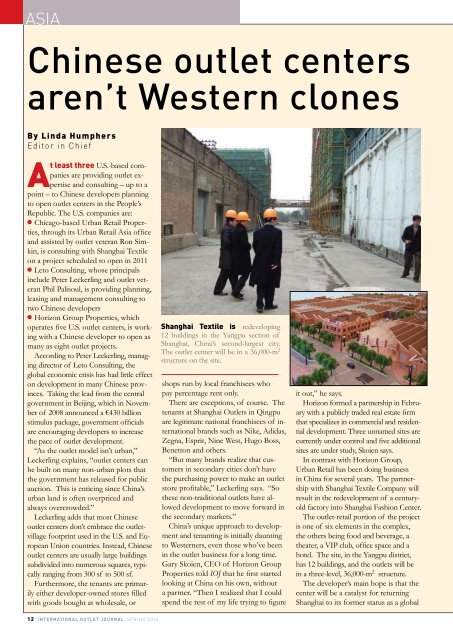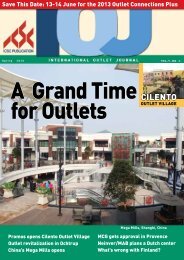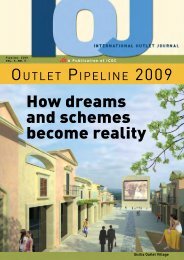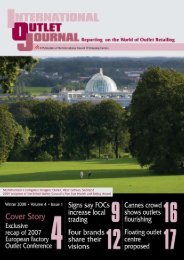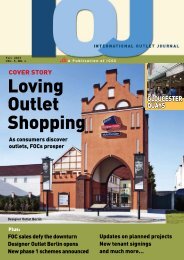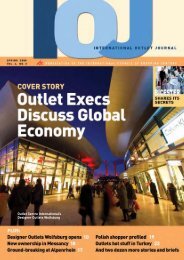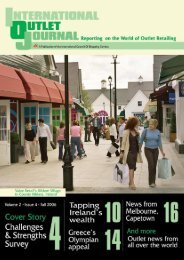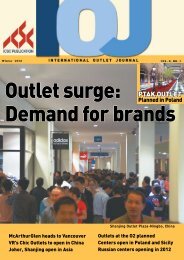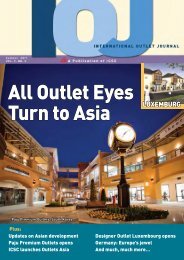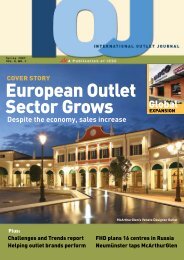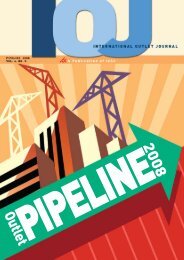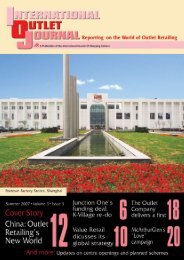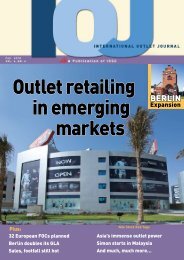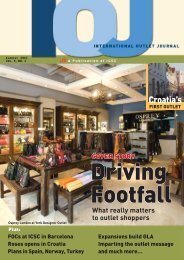Vigorous sales spur more outlet growth - Value Retail News
Vigorous sales spur more outlet growth - Value Retail News
Vigorous sales spur more outlet growth - Value Retail News
Create successful ePaper yourself
Turn your PDF publications into a flip-book with our unique Google optimized e-Paper software.
aSia<br />
Chinese <strong>outlet</strong> centers<br />
aren’t Western clones<br />
by linda humphers<br />
Editor in Chief<br />
At least three U.S.-based companies<br />
are providing <strong>outlet</strong> expertise<br />
and consulting – up to a<br />
point – to Chinese developers planning<br />
to open <strong>outlet</strong> centers in the People’s<br />
Republic. The U.S. companies are:<br />
l Chicago-based Urban <strong>Retail</strong> Properties,<br />
through its Urban <strong>Retail</strong> Asia office<br />
and assisted by <strong>outlet</strong> veteran Ron Simkin,<br />
is consulting with Shanghai Textile<br />
on a project scheduled to open in 2011<br />
l Leto Consulting, whose principals<br />
include Peter Leckerling and <strong>outlet</strong> veteran<br />
Phil Palisoul, is providing planning,<br />
leasing and management consulting to<br />
two Chinese developers<br />
l Horizon Group Properties, which<br />
operates five U.S. <strong>outlet</strong> centers, is working<br />
with a Chinese developer to open as<br />
many as eight <strong>outlet</strong> projects.<br />
According to Peter Leckerling, managing<br />
director of Leto Consulting, the<br />
global economic crisis has had little effect<br />
on development in many Chinese provinces.<br />
Taking the lead from the central<br />
government in Beijing, which in November<br />
of 2008 announced a €430 billion<br />
stimulus package, government officials<br />
are encouraging developers to increase<br />
the pace of <strong>outlet</strong> development.<br />
“As the <strong>outlet</strong> model isn’t urban,”<br />
Leckerling explains, “<strong>outlet</strong> centers can<br />
be built on many non-urban plots that<br />
the government has released for public<br />
auction. This is enticing since China’s<br />
urban land is often overpriced and<br />
always overcrowded.”<br />
Leckerling adds that most Chinese<br />
<strong>outlet</strong> centers don’t embrace the <strong>outlet</strong>village<br />
footprint used in the U.S. and European<br />
Union countries. Instead, Chinese<br />
<strong>outlet</strong> centers are usually large buildings<br />
subdivided into numerous squares, typically<br />
ranging from 300 sf to 500 sf.<br />
Further<strong>more</strong>, the tenants are primarily<br />
either developer-owned stores filled<br />
with goods bought at wholesale, or<br />
12 INteRNatIONaL OutLet JOuRNaL SPRiNg 2010<br />
Shanghai Textile is redeveloping<br />
12 buildings in the Yangpu section of<br />
Shanghai, China’s second-largest city.<br />
The <strong>outlet</strong> center will be in a 36,000-m 2<br />
structure on the site.<br />
shops run by local franchisees who<br />
pay percentage rent only.<br />
There are exceptions, of course. The<br />
tenants at Shanghai Outlets in Qingpu<br />
are legitimate national franchisees of international<br />
brands such as Nike, Adidas,<br />
Zegna, Esprit, Nine West, Hugo Boss,<br />
Benetton and others.<br />
“But many brands realize that customers<br />
in secondary cities don’t have<br />
the purchasing power to make an <strong>outlet</strong><br />
store profitable,” Leckerling says. “So<br />
these non-traditional <strong>outlet</strong>s have allowed<br />
development to move forward in<br />
the secondary markets.”<br />
China’s unique approach to development<br />
and tenanting is initially daunting<br />
to Westerners, even those who’ve been<br />
in the <strong>outlet</strong> business for a long time.<br />
Gary Skoien, CEO of Horizon Group<br />
Properties told IOJ that he first started<br />
looking at China on his own, without<br />
a partner. “Then I realized that I could<br />
spend the rest of my life trying to figure<br />
it out,” he says.<br />
Horizon formed a partnership in February<br />
with a publicly traded real estate firm<br />
that specializes in commercial and residential<br />
development. Three unnamed sites are<br />
currently under control and five additional<br />
sites are under study, Skoien says.<br />
In contrast with Horizon Group,<br />
Urban <strong>Retail</strong> has been doing business<br />
in China for several years. The partnership<br />
with Shanghai Textile Company will<br />
result in the redevelopment of a centuryold<br />
factory into Shanghai Fashion Center.<br />
The <strong>outlet</strong>-retail portion of the project<br />
is one of six elements in the complex,<br />
the others being food and beverage, a<br />
theater, a VIP club, office space and a<br />
hotel. The site, in the Yangpu district,<br />
has 12 buildings, and the <strong>outlet</strong>s will be<br />
in a three-level, 36,000-m 2 structure.<br />
The developer’s main hope is that the<br />
center will be a catalyst for returning<br />
Shanghai to its former status as a global


